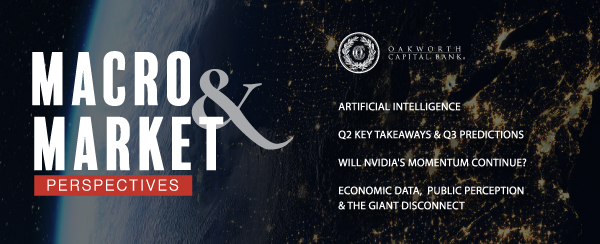- The Republican Convention seemed more like a coronation than a nomination for the former president. Even so, many in attendance, and more watching from home, may wonder why the GOP couldn’t put up a more unifying candidate.
- Eventual Fed rate cuts should help small- and mid-cap stocks. These have significantly underperformed large-cap stocks over the past several years. Once the Treasury yield curve becomes positively sloped again, as it will, investors will dump money into this asset class. You won’t want to be late to this party.
- Labor market weakness should continue through the end of the year. The differences between what businesses, workers and the government have been telling us are too great to continue. At some point, Washington will have to readjust its numbers to better reflect economic reality.
- Banks will be quick to slash deposit rates once the Fed starts cutting the overnight lending target. As a result, investors will gradually start to shift money back into the markets. While the first cut won’t cause a race to the exits, a steady stream of them will.
- The surprisingly robust U.S. consumer will show greater signs of exhaustion. High financing costs and lower saving rates mean the supply of “dry powder” is shrinking. A strong jobs market, despite showing signs of weakening, will prevent a decline in consumer activity. However, rapid growth in personal consumption expenditures (PCE) at this point seems unlikely without a complete reversal in monetary policy.
- The official inflation gauges continue to moderate. However, this won’t provide much relief for U.S. consumers, who continue to struggle with higher financing costs and prices for necessities. Unfortunately, absent a collapse in overall economic activity, it is hard to imagine the actual rate of inflation falling below the Fed’s desired target of 2%.
- The gap between the very rich and the very poor will continue to accelerate. This has less to do with tax policy than the lack of opportunity for the poorest of the poor in our society, and the unwillingness of those in power to be honest about it and work toward meaningful solutions. Unfortunately, it seems too many people have too much to personally lose by doing so.
- Retailers and businesses will continue to flee from jurisdictions that do not enforce the rule of law and individual property rights. Regardless of the dollar amount, theft is theft. Everyone seems to understand that other than the city councils in some of our nation’s largest cities.
- NVIDIA will continue to lead the market! We are just not sure in which direction……
- After the Fed cuts rates for the first time, bond investors will be in a real quandry. Will lower rates lead to higher inflation? If so, longer-term rates should increase, driving down bond prices. However, if the Fed stops shrinking its balance sheet, that could provide a backstop for the bond market. Suffice it to say, the Fed and the U.S. Treasury are walking a tightrope, and bond investors know it.
- During the next several quarters, it becomes increasingly clear that Washington is losing its war against fossil fuels. U.S. consumers don’t demand EVs to the degree necessary to make them profitable for the entire domestic auto industry. Utilities lack the capital to build renewable capacity quickly, and crude oil and natural gas are used for much more than fueling cars and generating electricity. Finally, many people worldwide aspire to our level of creature comforts, which will require cheap, efficient energy.
- The escalation of proxy and bushfire wars across the world suggests the global north’s dominance over geopolitics is waning. Countries like China, Iran, Russia and North Korea will continue to thumb their collective nose at American hegemony. Other countries, like India, Vietnam, Indonesia and Malaysia, will chart their own course, especially in the growing rivalry between China and the United States.
This content is part of our quarterly outlook and overview. For more of our view on this quarter’s economic overview, inflation, bonds, equities and allocations, read the latest issue of Macro & Market Perspectives.

The opinions expressed within this report are those of the Investment Committee as of the date published. They are subject to change without notice, and do not necessarily reflect the views of Oakworth Capital Bank, its directors, shareholders or employees.


